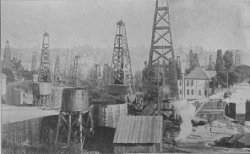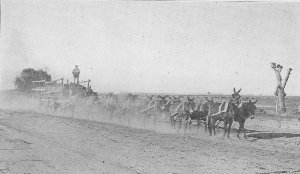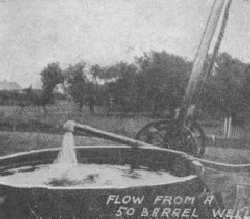Numerous reasons have been given for the discovery of the oil at Beaumont. Possibly the most picturesque is that men drew conclusions that a stream of oil flowed under the great state and pointed, as proof, to the oil up north, at Corsicana, and to an oil pool that was constantly swirling in the waters of the Gulf of Mexico, off the coast. Howbeit, in January 1901 prospectors struck oil. The well proved to be of immense flow. At once the news of the discovery was noised about over the South. More prospectors came to the district, to drill, and before long, a thriving city took the place of the sluggish town of Beaumont. A boom struck the town. A short distance away, on a small elevation known as Spindle Top Hill, derricks began to go up until a veritable forest of them appeared. The price of land mounted fabulously, as new oil wells "came in." Fortunes were made in a day. The streets of the little town were thronged with visiting speculators, who were looking for chances of snap investments, or for opportunities to unload stock in any of the numerous oil companies that sprang up. One caught the speculative fever from the atmosphere. It may be well to relate some of the instances of lucky strokes made by the first speculators. As soon as the news came of the first oil struck, there was one man who had faith in the oil bearing properties of the district, but he had only $20 to his name. Nothing daunted, however, he gave that sum for the option on the purchase of a large plat of ground near where the oil was first discovered. Then, going to New Orleans, he interested several capitalists and expert engineers in the project, organized an oil company, and after drilling some time, came upon a big "gusher." A few months later, without having sold any oil worth mentioning, the company sold the well to another company, for $1,250,000. Immediately after this, drilling was begun on some of the land still retained, and another paying well was found. People of all sorts and means got the fever and invested their money in oil stock, or land. Oil companies by the hundreds were organized within a few months, some of them with no other idea than getting money out of guileless country people, for prettily engraved certificates of worthless stock. Shares in companies were sold over the whole country, some as low as ten cents a share. Rich and poor alike became enthusiasts. Even the street urchins speculated. The writer, one day during the boom, met a bootblack in Beaumont, who offered to sell to him for $800, stock which had cost him only $30, and upon being refused, sold it a few minutes later, at the desired price. A young newspaper man who was well known to several stock promoters, was given an opportunity to buy stock of one of the companies before oil was struck. Not having the money he was given the stock on credit. Within two weeks, half this man's purchase was sold, and after paying for the whole purchase, he had several thousand dollars profit and the other half of his stock. This half of the stock was sold at a high price, but the company's well proved to be only a "duster"—that is, a pocket of gas, but no oil—and the shares were not worth the paper they were printed on. The speculation in land went on at a tremendous rate. A few wise countrymen, who had barren lands which were not worth more than $2 an acre, sold them for as many thousands. There was little trouble taken to prove ownership, or to record purchases. Transactions involving the transfer of hundreds of thousands of dollars took place in hallways, and corner drug stores, or saloons. One case is known where a plot of land changed hands in a cigar store, for $15,000. A man was standing at the cigar counter lighting his cigar, when be overheard the deal. Casually, he asked the purchaser what be would take for the land he had just bought. On being told $30,000, he snapped the land up as a bargain. Many poor people who never knew what riches were, found themselves wealthy in a night. Some of these were thrifty and saved their money. Others spent it foolishly at New Orleans and large neighboring cities. Some of the land owners refused big prices for their lands, expecting still higher figures. Most of these were later disappointed to find their land valueless. But, aside from the unusual prosperity, of a short-lived nature, as a result of the oil boom, there was the serious and valuable side of the enterprise. As a matter of fact, the wells near Beaumont are capable of giving far more oil than all other known wells. How long this will last, is not known. Already the flow has been so enormous that the pressure has subsided to a great extent. Yet there are still many companies that have arranged big storage tanks, of 500,000-gallon capacity, in some instances, to receive the oil, have built pipe lines to the Gulf, and are arranging for tank line steamers to export the oil. A serious misfortune overtook these oil fields in 1902. A fire ignited the oil in one of the tanks, and the conflagration spread until all Spindle Top Hill was badly damaged. The damage, however, was repaired.
THE MODERN PIANO |


